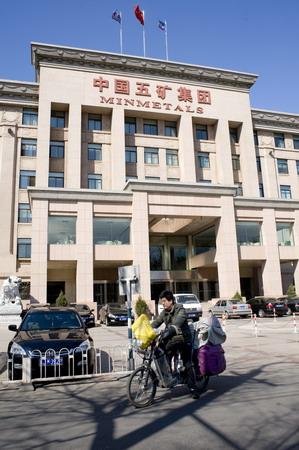
The headquarters of China Minmetals Corp in Beijing. China Reform Holdings Corporation Ltd has been tasked with investing in a variety of State-owned enterprises, such as Minmetals. [Photo / Bloomberg]
Qualified enterprises to get needed capital injections and resourcesBEIJING - China Reform Holdings Corporation Ltd, the State-owned capital operating company backed by the State-owned Assets Supervision and Administration Commission of the State Council (SASAC), was officially founded on Wednesday as an engine for the integration of China's State-owned enterprises (SOEs).
According to the SASAC, Xie Qihua, former president of Baosteel Group Corporation, China's largest steel company, will take the reins as president of China Reform Holdings with a registered capital of 4.5 billion yuan ($677 million).
"Establishing Reform Holding Corporation is an important step toward optimizing the allocation of State-owned assets in line with the State Council's strategy of strengthening the vitality, controlling force and influence of the economy," said Wang Yong, chairman at the SASAC.
The commission said the new company will acquire and restructure SOEs that are small-scale, have a low market share, and are not involved in crucial industries.
It will also drive the reform of these companies with capital injections and human resources and execute the withdrawal of State-owned assets from underperforming SOEs.
"We define China Reform Holdings as a market-based platform to operate and manage the State-owned assets in accordance with the SASAC's upgraded allocations for the SOEs," Wang said.
"We will take great efforts to guarantee that assets can be allocated reasonably, encouraging the capital injection of strongly competitive enterprises and stepping up the integration of those without the potential for sustainable development," Wang added.
"SOEs that could be acquired by China Reform Holdings include scientific and research institutions, and companies that have suffered substantial losses and are incapable of facing market challenges," said Chen Gong, chairman of Anbound Group, a private industry think tank.
"But there are very few underperforming SOEs because most have good business performance, with the advantage of government resources," Chen added.
As State-owned resources become more focused on the key companies under the commission's integration policy, the number of SOEs has been declining in recent years.
At present, there are 122 SOEs nationwide, compared with 196 in 2003, when the SASAC was established. In accordance with the policy, the commission will integrate another 20 enterprises, believing the quality and effect of these measures are more important than the difficulties.
The evaluation of SOEs' market competitiveness is the only way of testing the effect of restructuring measures of State-owned assets, the SASAC said.
Earlier this month, the commission vowed to accelerate the listing of SOEs as part of an effort to institute a stockholding system and establish a modern corporate management structure.
Apart from China Reform Holdings, the SASAC owns two other State-owned asset-management companies, China Chengtong Group and the State Development and Investment Corporation, both of which have been involved in the management of SOEs' non-performing assets.
Wang of SASAC said China Reform Holdings will provide supplementary capital support in some strategic and emerging industries to strengthen key fields that are vital to the country's economic lifelines.
China Reform Holdings now holds a 2.5 percent stake of China Minmetals Corp, the nation's largest steel and metals trader.





